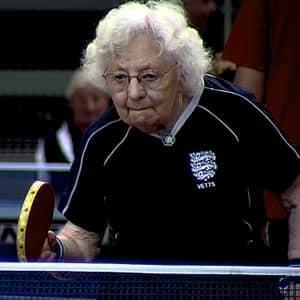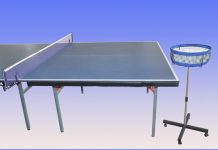Let us take a moment to reflect on the magnetic pull of table tennis, a sport that has effortlessly enthralled generations of players and spectators alike. From the moment the small white ball dances across the table, triggering an adrenaline-fueled flurry of back and forth, it becomes clear that there is something undeniably captivating about this game. But what exactly is it that makes table tennis so addictive?
Review contents
The Physical Nature of the Game
Fast-paced gameplay
Table tennis is known for its fast-paced gameplay, which is one of the reasons it is so addictive. The quick and rapid exchanges of shots keep players engaged and on their toes. With the ball traveling at high speeds, it requires quick reflexes and agility to react and anticipate the opponent’s shots.
High energy expenditure
Table tennis is not just a game of skill and strategy, but it also requires a significant amount of physical exertion. The constant movement, quick footwork, and swift strokes can make players break a sweat in no time. It provides a great cardiovascular workout, helping to burn calories, improve stamina, and boost overall fitness levels.
Physical coordination and agility
Playing table tennis requires a high level of physical coordination and agility. It involves precise hand-eye coordination to hit the ball, quick footwork to move around the table, and balance to maintain control during fast-paced rallies. These physical demands not only improve motor skills but also contribute to overall physical fitness.
The Strategic Aspect of the Game
Tactical decision-making
Table tennis is not just a game of hitting the ball back and forth; it requires strategic thinking and decision-making. Players must analyze their opponent’s strengths and weaknesses, adapt their playing style accordingly, and strategically place shots to gain an advantage. This element of strategy adds a layer of complexity and keeps players mentally engaged throughout the game.
Mind games and psychological warfare
In addition to tactical decision-making, table tennis also involves mind games and psychological warfare. Players try to deceive their opponents with subtle changes in spin, speed, and placement of the ball. This mental aspect of the game adds excitement and challenges players to stay focused and anticipate their opponent’s moves.
Continuous learning and improvement
No matter how skilled a player becomes, there is always room for improvement in table tennis. The game offers endless opportunities for learning and honing skills. Whether it’s mastering a new serve technique, perfecting a specific shot, or analyzing professional matches for inspiration, there is always something new to learn and improve upon. This constant pursuit of growth keeps players engaged and motivated to keep playing.
This image is property of www.tabletenniscoach.me.uk.
The Social Aspect of Table Tennis
Opportunities for social interaction
Table tennis is a social game that brings people together. Whether it’s playing in friendly matches with friends and family or joining a local table tennis club, the game provides opportunities for social interaction. It allows players to connect, socialize, and bond over their shared interest, fostering friendships and creating a sense of community.
Sense of belonging and community
Being part of a table tennis community provides a sense of belonging. Players often form strong friendships, support each other’s progress, and celebrate achievements together. The shared passion for the game creates a close-knit community where players can find support, encouragement, and a sense of belonging.
Competition and camaraderie
While table tennis can be a fiercely competitive sport, it also brings out a sense of camaraderie among players. Even during intense matches, there is often a mutual respect and admiration for each other’s skills. Players appreciate the competition and challenge each other to perform at their best while still enjoying the game together.
The Varied and Flexible Gameplay
Different playing styles
One of the fascinating aspects of table tennis is the wide variety of playing styles. Each player has their own unique approach to the game, which adds excitement and unpredictability. From aggressive attacking players to defensive players relying on sharp returns, the diverse playing styles keep the game fresh and interesting.
Variety of spin techniques
Spin is an essential component of table tennis, and the game offers a wide variety of spin techniques. Players can apply topspin, backspin, sidespin, or a combination of these to manipulate the trajectory and behavior of the ball. The ability to control and utilize spin adds depth and complexity to the gameplay, requiring players to adapt their techniques and tactics accordingly.
Adapting to different opponents
Table tennis players face a variety of opponents with different playing styles and skill levels. Adapting to these different opponents and adjusting strategies accordingly is a crucial aspect of the game. It challenges players to be versatile, think on their feet, and adjust their gameplay based on the opponent’s strengths and weaknesses. This constant need to adapt keeps players engaged and continuously learning.
This image is property of cdn.myportfolio.com.
The Thrill of Competition
Desire for victory
The desire for victory is a powerful driving force in table tennis. The adrenaline rush of competing against an opponent, the anticipation of winning a point, and the satisfaction of achieving a win can be highly addictive. The competitive nature of table tennis motivates players to push their limits, work hard, and strive for success.
Elevated adrenaline rush
Table tennis provides an intense and exhilarating experience that can elevate adrenaline levels. The fast-paced rallies, the quick reflexes required, and the need to think and react quickly all contribute to an adrenaline rush during gameplay. This rush of adrenaline adds to the excitement and makes table tennis an addictive sport.
Constant challenge and goal setting
Table tennis offers a constant challenge for players. Whether it’s improving skills, winning against tougher opponents, or achieving personal goals, there is always a new challenge to conquer. This constant pursuit of challenges and the act of setting and achieving goals keeps players engaged, motivated, and addicted to the game.
The Health Benefits of playing Table Tennis
Improved cardiovascular fitness
Table tennis is an excellent form of cardiovascular exercise. The constant movement and fast-paced nature of the game increase heart rate, improve blood circulation, and strengthen the heart muscles. Regular play can enhance cardiovascular fitness, reduce the risk of heart disease, and improve overall cardiovascular health.
Enhanced reflexes and coordination
Table tennis requires fast reflexes and precise hand-eye coordination. The game challenges players to react quickly to incoming shots and accurately return the ball. With regular play, reflexes and coordination improve, leading to better motor skills and overall physical dexterity.
Stress reduction and mental well-being
Engaging in physical activity, such as table tennis, releases endorphins, which are known as “feel-good” hormones. These hormones help reduce stress, alleviate anxiety, and promote overall mental well-being. Playing table tennis also provides an outlet for frustrations, allowing players to release tension and boost their mood.
This image is property of www.telegraph.co.uk.
The Accessibility and Affordability of the Sport
Minimal equipment and space requirements
One of the reasons table tennis is so accessible is its minimal equipment and space requirements. All you need is a table, paddles, and a ball to get started. Unlike many other sports, table tennis can be played in small spaces, making it accessible to a wide range of individuals.
Relatively low cost
Compared to other sports, table tennis is relatively affordable. The equipment costs are minimal, and once you have a table and paddles, the ongoing expenses are minimal. Additionally, many parks, community centers, and schools provide free or low-cost access to table tennis facilities, further reducing the financial barrier to entry.
Inclusive for all ages and abilities
Table tennis is a sport that can be enjoyed by people of all ages and abilities. It doesn’t require a high level of physical fitness or athletic prowess, making it accessible to a wide range of individuals. Whether you’re a beginner or an experienced player, young or old, table tennis offers an inclusive and welcoming environment for everyone to participate and enjoy.
The Upward Trend of Table Tennis Popularity
Increased media coverage and exposure
Table tennis has experienced increased media coverage and exposure in recent years. Major tournaments and events are televised, allowing the sport to reach a wider audience. This increased media presence has helped raise awareness and generate interest in table tennis, contributing to its growing popularity.
Table tennis as a professional sport
Table tennis has also gained recognition as a professional sport. Professional players compete in prestigious tournaments worldwide, showcasing their skills and athleticism. With the professionalization of the sport, more people are inspired to take up table tennis as a serious endeavor, further fueling the sport’s popularity.
Growing interest in recreational activities
The growing interest in recreational activities and the focus on maintaining an active lifestyle have contributed to the rise in table tennis’s popularity. As people seek fun and engaging ways to stay active, table tennis provides an accessible and enjoyable option. Its combination of physical activity, mental stimulation, and social interaction makes it a perfect choice for recreational enthusiasts.
This image is property of qph.cf2.quoracdn.net.
The Multifunctional Nature of Table Tennis
Can be played for recreational purposes
Table tennis can be enjoyed purely for recreational purposes. Whether it’s a casual match with friends, a fun family activity, or a way to unwind and have fun, table tennis offers an entertaining experience for players of all skill levels.
Used as a competitive sport
Table tennis is also played at a competitive level, with players participating in tournaments and leagues at various levels of skill and age groups. The game’s strategic and physical demands make it an exciting and challenging competitive sport, attracting serious players seeking to test their abilities.
Training tool for other sports
Table tennis offers several benefits that can be valuable for athletes in other sports. Its emphasis on hand-eye coordination, reflexes, agility, and strategy can serve as a valuable training tool for athletes looking to improve their overall performance.
The Psychological and Cognitive Benefits
Improved focus and concentration
Table tennis requires intense focus and concentration. The fast-paced gameplay and the need to anticipate and react quickly keep players mentally engaged throughout the game. Regular play can enhance focus and concentration skills, which can be beneficial in various aspects of life, both on and off the table.
Boosted cognitive function
The mental demands of table tennis can have a positive impact on cognitive function. The quick decision-making, problem-solving, and strategic thinking involved in the game stimulate the brain and improve cognitive capabilities. Regular play can enhance memory, improve multitasking skills, and sharpen overall cognitive functioning.
Enhanced mental resilience
Table tennis can help develop mental resilience and the ability to stay composed under pressure. Dealing with unexpected shots, adapting to varying playing styles, and bouncing back from losses all contribute to building mental fortitude. These skills can be applied in other areas of life, promoting resilience and a positive mindset.
In conclusion, table tennis is addictive for several reasons. Its fast-paced gameplay, physical demands, and strategic nature make it an exciting and engaging sport. The social aspect, health benefits, accessibility, and affordability also contribute to its popularity. Whether played for fun or at a competitive level, table tennis offers a multifunctional experience that promotes physical fitness, mental well-being, and personal growth. So grab a paddle, find a partner, and experience the addictive thrill of table tennis for yourself!
This image is property of static.independent.co.uk.



























![Best Outdoor Dartboards [Reviews and Buying Guide 2024] Best Outdoor Dartboards](https://gamersets.com/wp-content/uploads/2022/12/Best-Outdoor-Dartboards-100x70.jpg)

![Best Mini Air Hockey Table [Reviews & Buying Guide 2024] Best mini air hockey table](https://gamersets.com/wp-content/uploads/2022/10/Best-mini-air-hockey-table-100x70.jpg)







